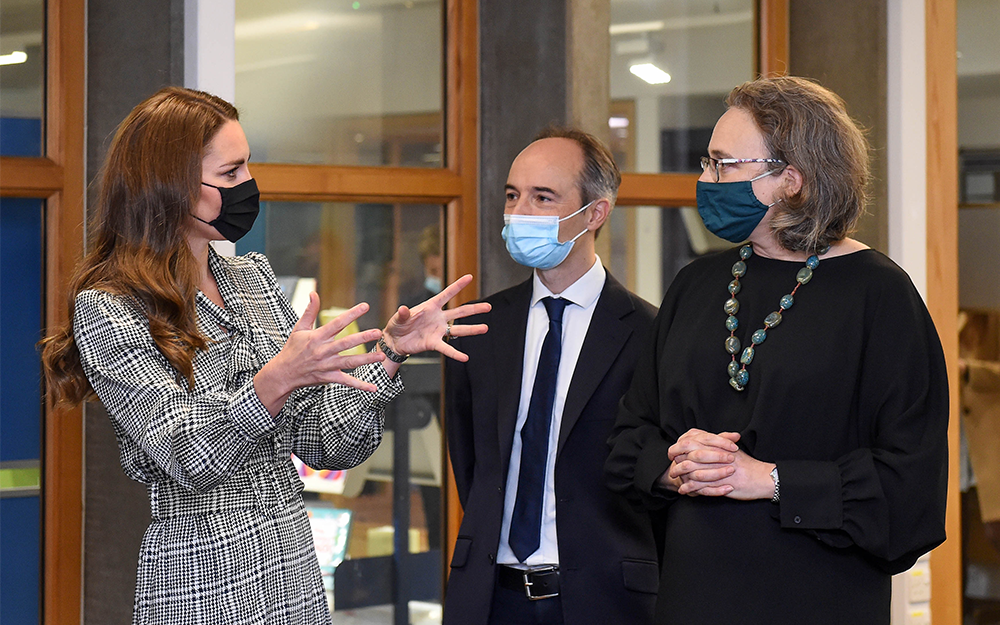The ‘Shaping Us’ campaign – a welcome spotlight on the early years
By Blog Editor, IOE Digital, on 3 February 2023

Catherine, Duchess of Cambridge, Professor Pasco Fearon, and Professor Alissa Goodman, during a 2021 visit to UCL. Credit: Parsons Media for UCL.
3 February 2023
It was exciting to be invited earlier this week to the launch of Shaping Us, the new Royal Foundation Centre for Early Childhood campaign to raise awareness of how important the early years are for shaping the adults we become.
At the launch, the Princess of Wales showed her obvious passion for and commitment to improving the lives of all children, from their earliest stages of life. Her serious personal interest in the deep scientific underpinnings for why the early years matter is also very striking. We were shown a preview of the campaign video, which is now showing in cinemas around the UK. It isn’t just a warm and emotional take on one girl’s journey to age five. Every feature, beautifully depicted in clay, speaks to the detail of the developmental journey and our best scientific understanding of the myriad ways that young lives can be positively shaped by the interactions around them.
One important feature of the campaign is its life course lens. Early childhood is of course an intensely precious time in and of itself, but it is also a deeply formative time, when the interactions that we experience and the developmental pathways that we take can either help us build a firm foundation for our future lives, or can make us vulnerable in long-reaching ways.
One of the key sources of evidence on how the early years matter are longitudinal studies which track individuals throughout their lives, and the Royal Foundation recently published a case study for why longitudinal studies are valuable for early years research. At the UCL Centre for Longitudinal Studies (CLS), we run three of the UK’s unique series of national birth cohort studies, following nationally representative groups of those born in 1958, 1970, and around the Millennium, into adulthood, and indeed now into older age. We also collaborate closely with our colleagues at UCL who run the 1946 cohort study, the oldest and longest standing birth cohort study in the world. We were delighted when the Princess came to visit us at CLS in 2021 to learn more about our work, with a focus on one of our new studies, the Children of the 2020s. This study has recently finished collecting its first wave of data among a new cohort of babies born in England, at nine months old, and will follow them at least until they start school.
These are unique scientific resources for understanding just how formative the environments we experience and the skills developed in early life are, for so many aspects of our lives. For example, they’ve been exceptionally important for highlighting the impact of social inequalities, and the long reach of adverse experiences in childhood such as poverty, bullying, and maltreatment, which have been shown to affect everything from health and wellbeing, to our fortunes at work, and our personal relationships. Moreover, they not only show how the cycle of disadvantage runs across multiple generations, but also offer insight into how these cycles can be broken, including by reducing the educational disadvantages experienced by young people from poorer backgrounds, and supporting mental health.
Our recent chapter on the early years for the IFS Deaton review into inequalities echoes many of the themes of the new Shaping Us campaign, and drew heavily on evidence from the Millennium Cohort Study. For example, in the Princess’ speech at the campaign launch, she emphasised the importance of looking after the social and emotional development of children in the early years. Our work shows how this shapes later life outcomes to a remarkable degree, and also just how wide inequalities in social and emotional development are among children in the UK.
One place where the royal campaign, which is focussed on raising awareness, doesn’t stray is policy. This is understandable given royalty and politics do not mix. However, protecting children from the devastating consequences of poverty and other sources of distress at home is one of the most pressing issues of the current time, one that requires intervention at multiple levels. It requires a focus on parenting and relationships – ensuring that parents’ own mental health is taken care of, so that they are in the best possible position to develop nurturing relationships with their children, and providing early parenting support. But focussing on parents and relationships, although important, isn’t enough: policies that address major structural factors are vital too, such as reducing child poverty and ensuring access to stable and high-quality housing, in order to create the stability and safety that are needed for healthy development. Addressing such inequalities early, and at their roots, would support happy childhoods, and bring lasting benefits throughout life.
One Response to “The ‘Shaping Us’ campaign – a welcome spotlight on the early years”
- 1
 Close
Close




[…] This article was originally published on the IOE London Blog. […]